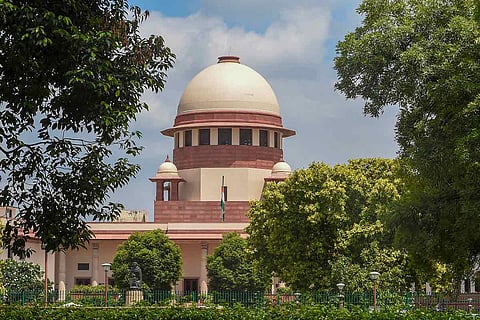

The Chief Justice of India (CJI) DY Chandrachud said that if the Union government wants an anonymous scheme for receiving donations while ensuring a level playing field, then donations should be distributed to political parties on an equitable basis through the Election Commission of India (ECI). The CJI made the remark when a five-judge Constitution Bench was hearing a batch of pleas challenging the electoral bonds scheme, for the second day on Wednesday, November 1. The bench also comprises Justices Sanjiv Khanna, BR Gavai, JB Pardiwala, and Manoj Misra.
Solicitor General (SG) Tushar Mehta, appearing on behalf of the Union government, refuted the petitioners’ allegation that the scheme is anonymous and opaque. “What is anonymity or opaqueness, it is nothing but confidentiality by design. If the element of confidentiality goes from the scheme, then the scheme goes,” he argued.
The SG contended that electoral bonds are not a standalone effort to counter black money. According to him, the first step in fighting black money was the digitisation drive, followed by de-registration of shell companies. Electoral bonds were a part of the drive to prevent using black money in the electoral process, he said.
CJI Chandrachud observed that the problem with the scheme is that it provides ‘selective anonymity’. “It's not completely anonymous … A large donor would never take the risk of buying the electoral bonds. All that the large donor has to do is to disaggregate the donation, get people who will purchase electoral bonds with small amounts, which will be then purchased by official banking channels, not through cash,” he said. He added that an attempt to bring black money into the official channel has created an “informational hole" as to who is donating to whom.
The SG argued that if the details of electoral bonds are not kept confidential, it would lead to the victimisation of the donors. Interrupting this, Justice Khanna pointed out that there was a caveat in the SG’s argument that “victimisation and retribution is normally by a party in power, not by a party in opposition”.
Read: Citizens don’t have right to know funding of political parties: Union govt on electoral bonds
“The other issue is selective confidentiality … It is easier for the party in power to get the information. Because of this selective confidentiality, the opposition party may not know who your donors are. But donors to the opposition party can be ascertained, at least by the investigative agencies. So they're at a disadvantage to question you on your donations. On the other hand, the opposition parties' donations will be questioned… That is where the level playing field is getting disturbed. That is what [the petitioners] are contending,” Justice Khanna observed.
Another argument made by SG Tushar Mehta was that if the scheme is struck down, it will take the country back to the conditions that existed before it. The CJI said that this argument is not a valid reason to preclude the government from introducing a transparent scheme that offers a level playing field. He said that the process of ensuring that electoral funding relies less on cash and more on accountable transactions is a “work in progress”.
During the second day of hearings on Wednesday, the petitioners and intervenors completed their submissions. Senior Advocate Vijay Hansaria, appearing for one of the petitioners, argued that corporate funding for political parties through electoral bonds “strikes at the root of democracy” and “demeans transparency”. “Transparency needs accountability, which leads to credibility, then it leads to public faith, and public faith results in a healthy democracy,” he said, adding, “Opaqueness allows transactions behind iron curtains that lead to improper influence of money power and allows wealthy contributors to influence policy making, resulting in loss of public trust in governance.”
The batch of Public Interest Litigations (PIL) challenging the electoral bonds scheme contend that the finances of political parties should be made public in the same way that criminal antecedents of candidates are. The pleas were referred to a five-judge Constitution Bench by a three-judge bench of the SC on October 16. Electoral bonds are similar to promissory notes and were introduced in 2017. Citizens and bodies incorporated in India can purchase these bonds and donate anonymously to political parties.
Read: ‘Electoral bonds are anonymous white channels of black money’: Petitioners to SC